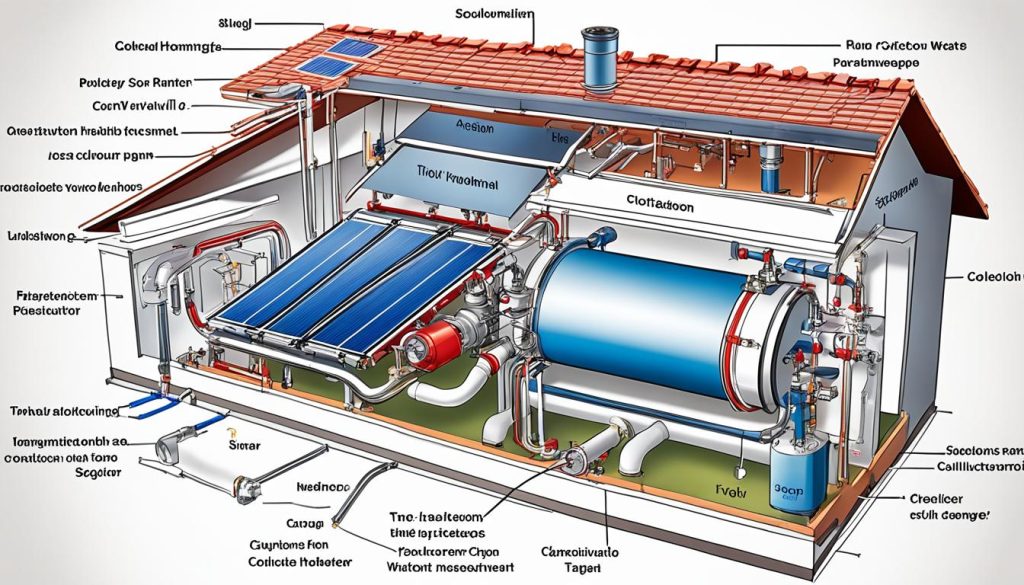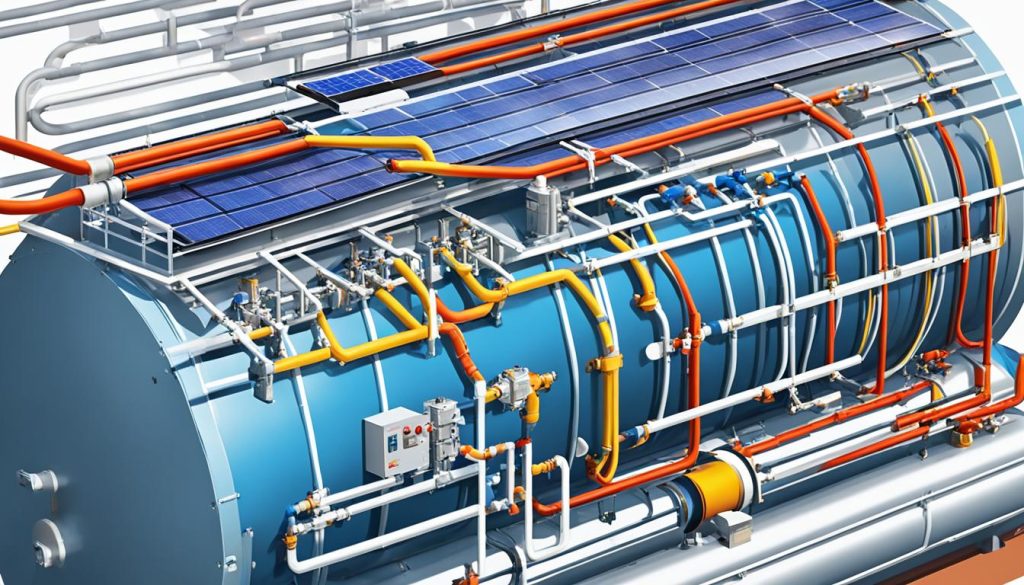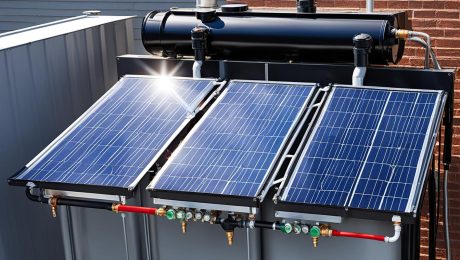what is inside solar water heater system
Use the sun’s power to heat your water with a solar water heater system. This green technology uses the sun’s energy to warm water for your home or business. But what’s inside these devices? Let’s explore the main parts that make solar water heaters a smart and earth-friendly option.
Key Takeaways
- Solar water heaters use the sun’s energy to heat water for homes and businesses.
- The system has key parts like solar collectors, storage tanks, and circulation systems.
- They are a green choice compared to traditional heating, cutting energy costs and emissions.
- Knowing how these systems work helps people make better choices for their water heating.
- Right installation and upkeep are key for the best performance and life of solar water heaters.
Introduction to Solar Water Heaters
Solar water heaters use the sun’s power to heat water for homes and businesses. They cut down on the need for traditional energy sources. This makes them a sustainable and cost-saving way to heat water.
Overview of Solar Water Heating Technology
A solar collector is the core of a solar water heater. It catches the sun’s rays and heats the water. The hot water is then kept in a tank that stays warm, ready for use anytime.
This design lets solar water heaters work without electricity or fossil fuels. This makes them good for the planet.
Benefits of Using Solar Water Heaters
- Reduced energy costs: Solar water heaters can cut your bills by using less electricity or gas for heating water.
- Environmentally friendly: They use solar energy, which lowers your carbon footprint and helps the environment.
- Long-term sustainability: With little upkeep and lasting up to 20 years, they’re a lasting solution for hot water.
- Increased property value: Adding a solar water heater can make your home more appealing to buyers.
Solar water heaters are getting more popular as people look for renewable energy options. They offer a dependable and green way to get hot water.

“Solar water heaters are a smart investment that pays dividends for years to come, both in terms of energy savings and environmental impact.”
Solar Water Heater
A solar water heater, also known as a solar geyser, uses the sun’s power to heat water. It’s becoming more popular because it’s good for the environment and can save money over time.
It works by using solar collectors to catch the sun’s rays and heat the water. This heated water is then stored in a tank for later use. Using this system, people can use less energy and produce fewer greenhouse gases.
How Solar Water Heaters Work
Solar water heaters have a few main parts that work together to heat water:
- Solar collectors: These panels catch the sun’s energy and transfer it to the water.
- Storage tank: The heated water is kept in an insulated tank, ready for when it’s needed.
- Circulation system: This system moves the water between the collectors and the tank, keeping it heated.
Heating the water is simple. The sun’s rays hit the solar collectors, warming the water flowing through them. This heated water goes into the insulated tank, staying warm until it’s used.
“Solar water heaters are a smart investment for homeowners and businesses looking to reduce their energy costs and environmental impact.”
Using a solar water heating system brings many benefits. These include lower energy bills, less pollution, and more independence from traditional energy sources.

Components of a Solar Water Heater System
Building an efficient solar water heater system takes careful thought. It needs the right parts working together. At the core are the solar collectors and the storage tank. These parts work together to catch the sun’s energy and give you hot water.
Solar Collectors
The solar collectors are key, catching the sun’s heat and sending it to the water. These panels on your roof aim for the sun and turn sunlight into heat well. They move water or a special fluid through the collectors to heat the water for storage.
Storage Tank
After heating, the water goes into an insulated tank. This tank is vital for a steady supply of hot water, even when the sun isn’t shining or when you need more. Its design and insulation keep the water hot, so it’s ready when you are.
The solar water heater parts work well together to turn sunlight into usable hot water. If you want to cut your energy costs or live greener, knowing how these systems work helps. It makes choosing the right solar heater price and water solar price easier.
Types of Solar Water Heater Systems
Homeowners and businesses have many options for solar water heaters. These systems vary in design, function, and what they’re best used for. Knowing about the different types can help you pick the right one for your needs.
The flat-plate collector system is a common choice. It has a flat panel that catches the sun’s energy and sends it to water in an insulated tank. These collectors are tough and work well, making them great for homes and businesses.
Then there’s the evacuated tube collector system. It uses glass tubes with a smaller tube inside each one to keep heat in and send it to the water. These collectors work better in cooler places and can heat water more, making them efficient.
- Solar water heater 200 ltr price: These systems are great for big families or businesses, holding 200 to 500 liters of water.
- Solar water heater 100 ltr price: For smaller needs, like a single person or a small family, a 100-liter system is a good choice.
When picking a solar water heater, think about your location, the weather, how much hot water you need, and your budget. Talking to a professional can help you find the best system for your situation.
“Solar water heaters are a smart investment that can not only save you money on your energy bills but also reduce your carbon footprint and contribute to a more sustainable future.”
Active vs. Passive Solar Water Heaters
There are two main types of solar water heating systems: active and passive. Each has its own benefits. Knowing the differences helps homeowners pick the right one for their needs.
Active Solar Water Heater Systems
Active solar water heaters use pumps to move the water around. They are more complex and need extra parts like a controller and a pump. But, they work better and are more efficient. They can control the water flow and heat transfer well.
Active systems are also more flexible. This means they can be customized to fit specific needs.
Passive Solar Water Heater Systems
Passive solar water heaters use natural convection to move the water. They are simpler and cheaper because they need fewer parts. The sun heats the water, which then moves up and circulates without a pump.
Even though they’re not as efficient as active systems, passive heaters can still give a lot of hot water for a home.
Both active and passive solar water heaters are great for using the sun’s power and cutting down on traditional heating. The choice depends on the budget, space, and what the homeowner prefers.
Installation and Maintenance
Installing and maintaining a solar water heater right is key to its success. Whether you’re setting up a solar geyser or a full solar water heating system, doing it correctly is crucial. It helps you save money and use energy wisely.
Installation Considerations
It’s important to pick the best spot for your solar water heater. Look for a spot that gets lots of sunlight all day. Make sure it’s not blocked by trees, buildings, or other things.
The collectors should be angled and placed just right to catch the most sun. This is important for getting the most energy.
Getting the plumbing and electrical right is also key. You’ll need a pro to connect your solar water heater safely to your home’s systems.
Maintenance Tasks
- Regularly clean the solar collectors to keep them free of dirt and shadows.
- Check and refill the system’s fluid as needed.
- Look for leaks or corrosion in the storage tank.
- Adjust the system’s tilt or orientation if it’s not working right.
- Replace old or broken parts, like pumps or valves, to keep things running smoothly.
By following these steps for installation and upkeep, your solar water heater will keep giving you hot water affordably and sustainably for a long time.
Getting a good solar water heating system is just the start. Proper setup and regular care are what make it work best. This way, you get to enjoy the benefits of clean energy for years.
Factors Affecting Solar Water Heater Performance
The performance of a solar water heater depends on many things. These include the location, climate, and the system’s size compared to the demand. Knowing these factors is key to making your solar water heater work better.
Location and Climate
Where you live and the weather affect your solar water heater a lot. Places with lots of sun and few clouds work best for these heaters. Things like your location’s latitude, height, and how much sun you get in different seasons matter too.
System Size and Demand
The size of your solar water heater and how much hot water you need are also important. You should think about your needs and pick a system that fits. A system that’s too small won’t keep up, and one that’s too big wastes energy and costs more.
By thinking about these things and making smart choices, you can make sure your solar water heater works well. It will give you hot water efficiently and help the planet too.
Cost and Energy Savings
Buying a solar water heater is a smart move for your wallet and the planet. The first cost might be higher than traditional systems, but you’ll save a lot later on.
Initial Investment
The starting price for a solar water heater is between $3,000 to $8,000. This depends on the system size, the solar collectors, and how hard it is to install. But, you can get help from tax credits, rebates, and incentives. This makes it easier for homeowners to afford it.
Long-term Cost Savings
- A solar water heater cuts your monthly bills by using the sun’s energy to heat water, not electricity or gas.
- Over 15 to 25 years, you can save thousands of dollars, based on where you live and your energy costs.
- In some places, you could save 50-80% on your water heating bills. This makes it a great long-term investment.
Think about the upfront cost and the long-term savings before deciding on a solar water heater. The first cost might seem high, but the savings over time make it a wise choice. It helps cut your energy bills and reduces your carbon footprint.
Solar Water Heater Price and Availability
The cost of solar water heaters in India varies a lot. It depends on the size, brand, and local market. A 100-liter model can cost between ₹20,000 and ₹35,000. A 200-liter model might cost from ₹30,000 to ₹50,000.
Government incentives and subsidies can lower the initial cost. This makes solar water heaters more affordable for homeowners and businesses.
In recent years, solar water heaters have become more available in India. Big brands like Tata Solar, Venus, and Havells offer many options. Local manufacturers and suppliers also provide competitive prices and choices.
The Indian government wants to make solar water heaters more accessible. They have started schemes and programs to promote renewable energy. These efforts, like the National Solar Mission and state subsidies, make solar water heaters cheaper and more available nationwide.
FAQ
What is the difference between an active and passive solar water heater?
Active solar water heaters use pumps to move the water. Passive systems let nature do the work, using convection to move the water.
What are the key components of a solar water heater system?
A solar water heater has solar collectors that catch the sun’s energy to heat water. The storage tank keeps the hot water ready for use.
How does the location and climate affect the performance of a solar water heater?
Where you live and the weather can change how well a solar water heater works. Sunlight, temperature, and humidity affect its efficiency.
What are the typical costs and energy savings associated with a solar water heater?
Solar water heaters cost more upfront than traditional ones. But, you’ll save money on energy bills over time. The savings depend on the system size, where you live, and energy prices.
How widely available are solar water heaters in the Indian market?
Solar water heaters are getting more common in India. You can find many models and sizes. Prices start around ₹20,000 for a 100-liter system and go up to ₹40,000 or more for a 200-liter one, based on the features and brand.
- Published in Solar Water Heater

 Call or Text:
Call or Text: 
